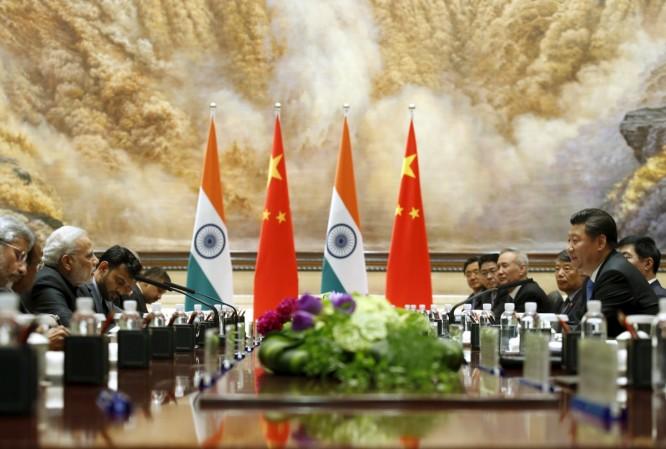India and China have been involved in a major standoff for over a month now in the Doklam or Doka La region, also known as the India-China-Bhutan tri-junction, located along the Sikkim border. The conflict between both countries is believed to be the most serious border dispute of late.
It all started after China accused India of violating border agreement saying Indian troops had allegedly entered the Doklam region and stopped the Chinese troops from constructing a road. India responded by saying the border dispute is yet to be resolved and China should "desist from changing the status quo."
Meanwhile, India has accused China of building roads on the India-China-Bhutan tri-junction and its People's Liberation Army (PLA) of intruding into Indian territory in Sikkim and destroying bunkers, while China has claimed India is provoking them and the issue can be resolved only if India withdraws its troops.
The standoff has also attracted the attention of the media across the world. Here is how the global media has reacted to the dispute:
The New York Times
The New York Times reported India was violating an 1890 border agreement signed between Britain and China previous Indian governments had pledged to uphold. The report said the agreement should be respected to end a "very serious" incursion by India.
The NYT report also mentioned China's version of the conflict saying Indian troops crossed into China's Doklam region in June and disrupted the construction work.
The report further said both countries confronted each other near a strategic valley that separates India from Bhutan.
South China Morning Post
Adding that Bhutan can solve its border dispute with China on its own if "India lets it", an article in the South China Morning Post stated the standoff "does not have much to do with the border, and definitely not the China-India border. The area under contention, between Bhutan and Tibet, has never been cartographically demarcated."

"In the 1950s, China negotiated and settled most of its land borders, but never completed discussions with Bhutan, because India insisted on the right to negotiate on behalf of Bhutan, which the Chinese refused to accept. China wanted direct negotiations with Bhutan. Eventually, India had to relent," the article said.
It added: "The Indian media's sabre-rattling on defending Bhutan from Chinese encroachment may be good for arousing nationalistic sentiment but does not find echoes in Bhutan."
Another article quoted a young captain of India's famous "Black Cats" division as saying: "We are under clear orders not to exacerbate the tensions, so we won't provoke a scuffle, certainly not a fire fight, but we are ready for a suitable response if the Chinese get aggressive. It's important for us to stop the Chinese here because if we fail, they will roll on to the Chicken's Neck and can cut off our Northeast."
It added: "India has spent the last four years raising a mountain strike corps of about 80,000 for a new limited offensive doctrine in the event of a war."
The article also described the Indian media as "hyper-nationalistic".
BBC

Describing it as an "eyeball to eyeball" standoff, BBC reported India and China have sent more troops to the Doklam region. Citing PTI, the channel quoted Chinese ambassador Luo Zhaohui as saying that India must "unconditionally pull back troops" to maintain peace in the region.
The report added that China's stand was being seen as a diplomatic escalation by the country, which has retaliated by stopping Indian pilgrims to travel to Mansarovar Lake in Tibet via the Nathu La pass in Sikkim. A formal agreement was signed by India and China to allow Indian pilgrims to visit the lake, considered to be a holy place of worship by the Hindus.
The report also highlighted the fact that Bhutan has asked China to stop building the road as it is a violation of an agreement signed between both countries. Sikkim is the only area where Indian troops can tackle a Chinese incursion as they have the advantage of being positioned on higher terrain.
The Guardian
![Beijing may support Sikkim's independence if Indian troops don't back off, warns Chinese media [Representational Image] Nathu La](https://data1.ibtimes.co.in/en/full/653999/nathu-la.jpg?h=450&l=50&t=40)
The British newspaper has quoted analysts from India and China as saying that an armed conflict between the neighbours is unlikely.
However, analysts have said the harsh language and the mobilisation of troops in the Doklam region, also known as the India-China-Bhutan tri-junction, have become unprecedented in recent years.
Describing the "rhetoric" on both sides as "increasingly pugilistic," the Guardian reported: "To avoid escalation, frontline troops in the area do not generally carry weapons, and the Chinese and Indian troops reportedly clashed by "jostling": bumping chests, without punching or kicking, in order to force the other side backwards."
The report added: "At the heart of the dispute are different interpretations of where the "tri-junction" — the point where the three countries' borders meet – precisely lies. China argues its territory extends south to an area called Gamochen, while India says Chinese control ends at Batanga La, further to the north."
The report quoted Srikanth Kondapalli, a professor of Chinese Studies at Jawaharlal Nehru University in Delhi, as saying that he believed the standoff would "die down in a little while." The professor's argument was that neither country wanted to "fight a full-blown war."















